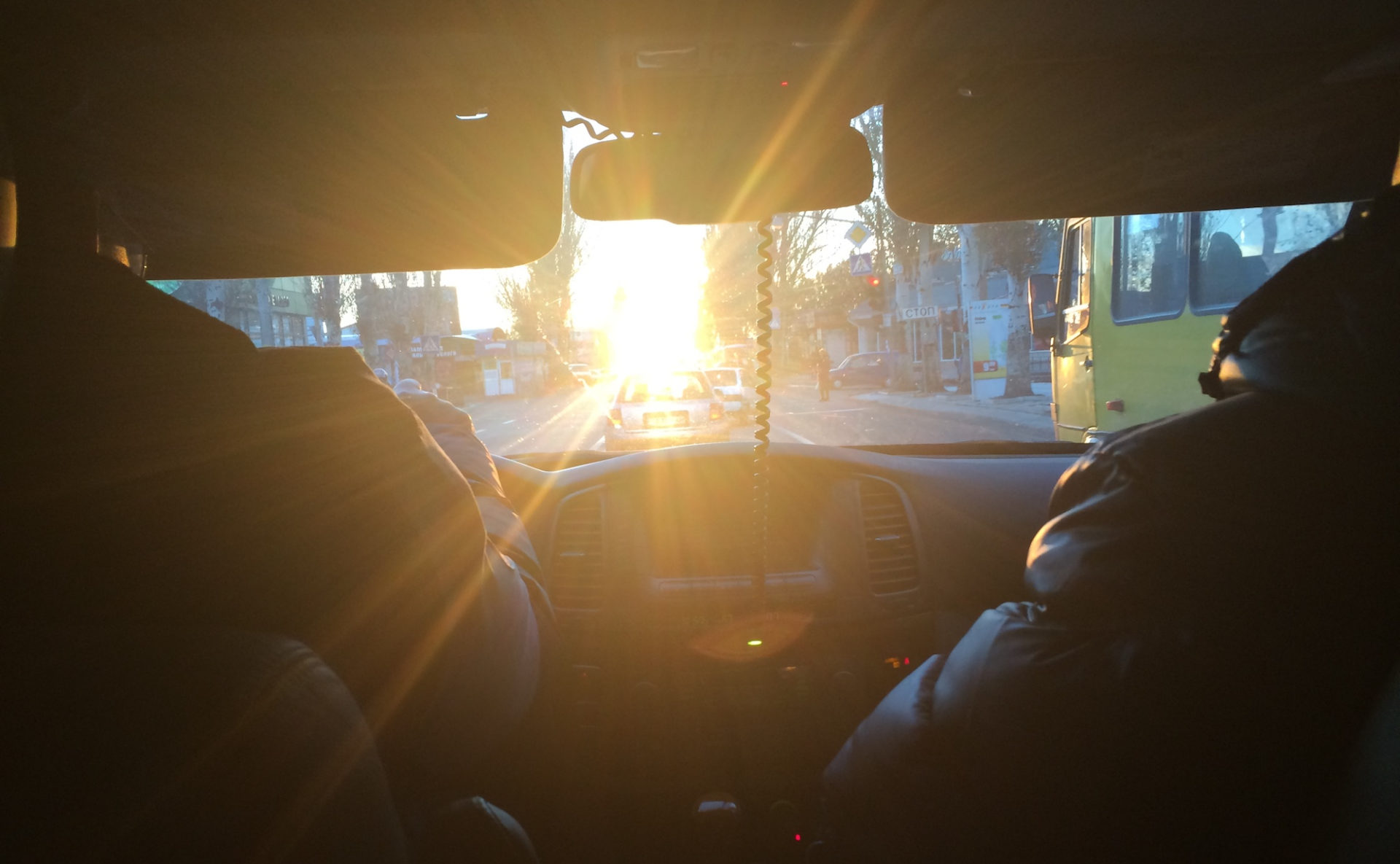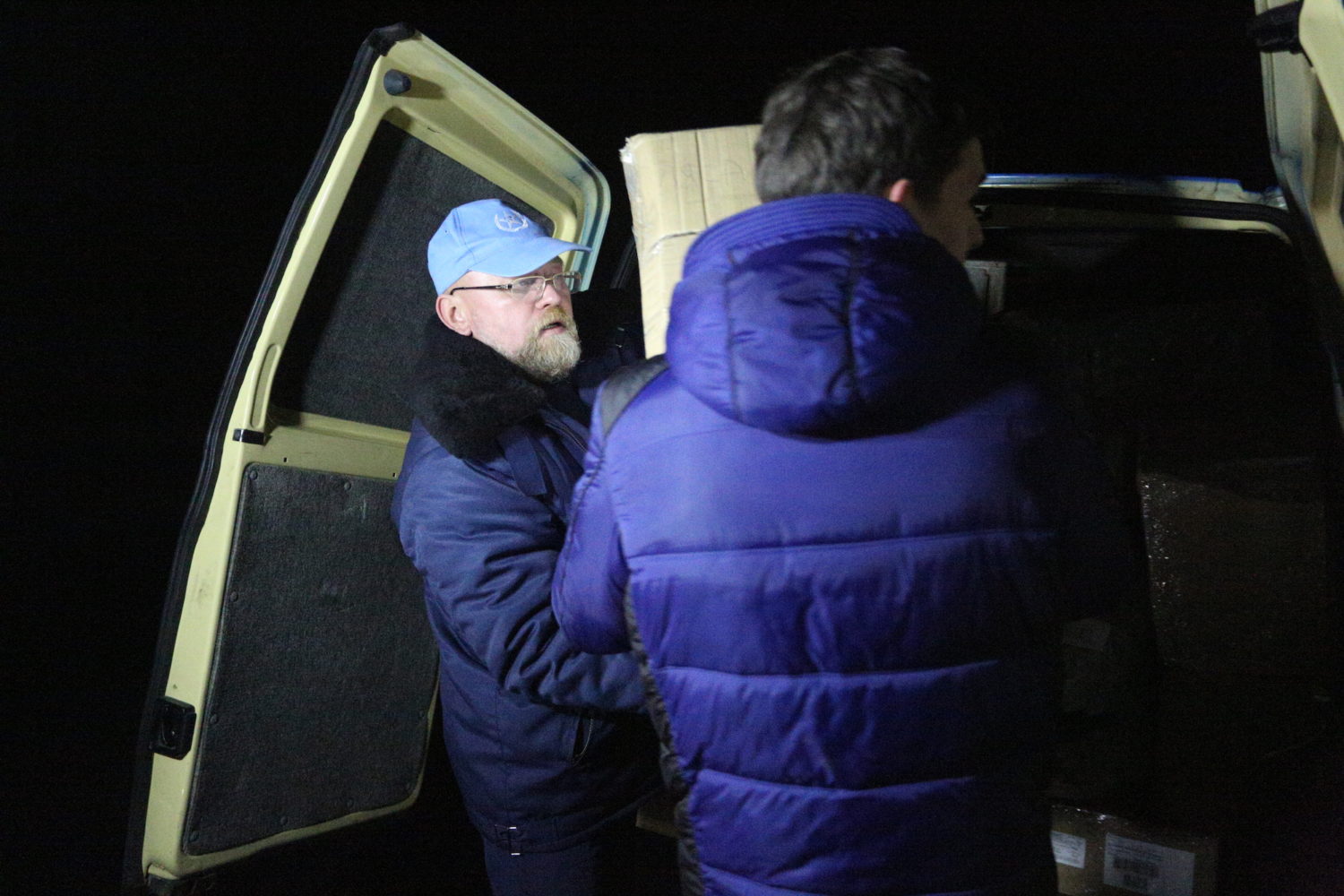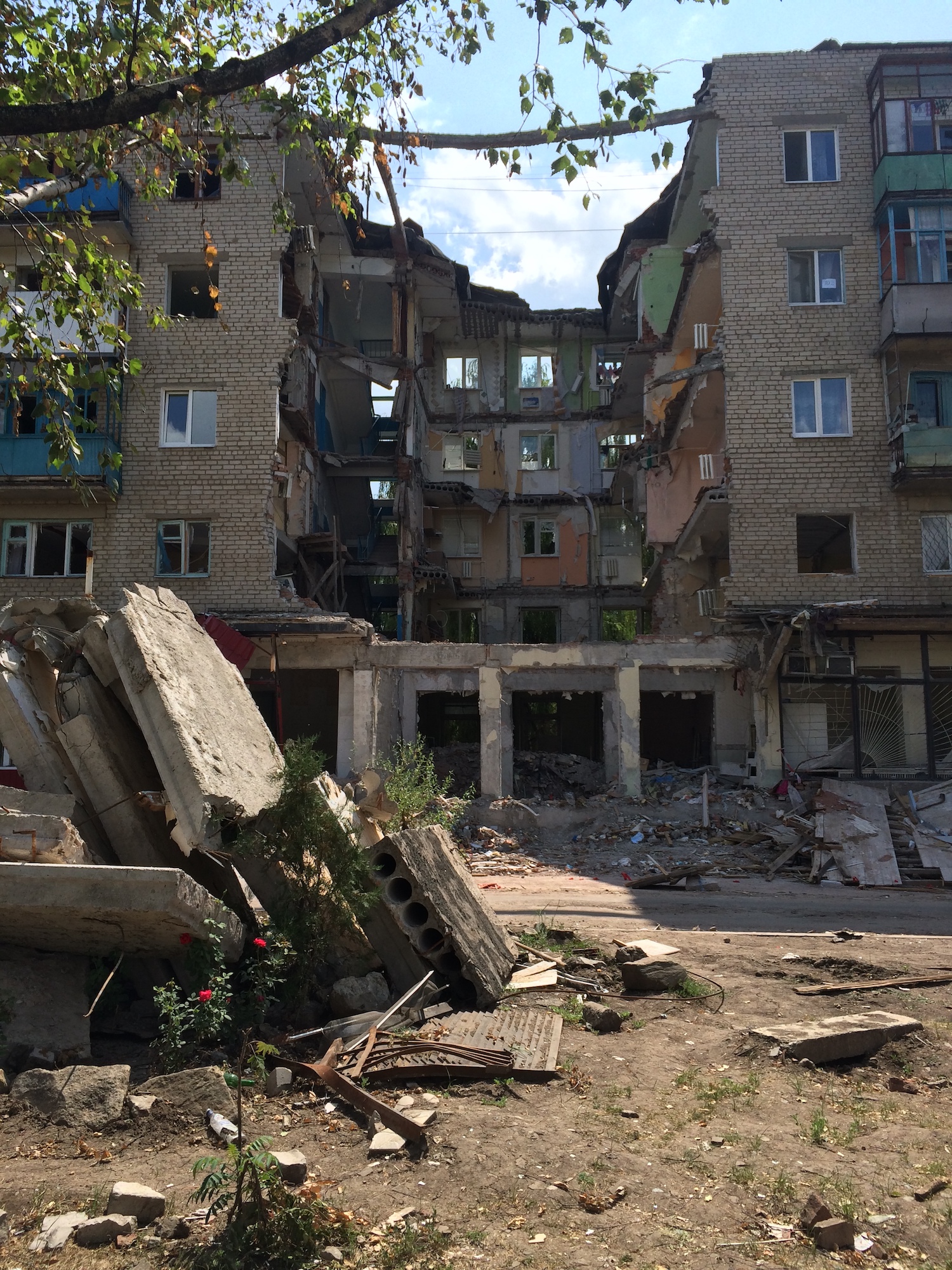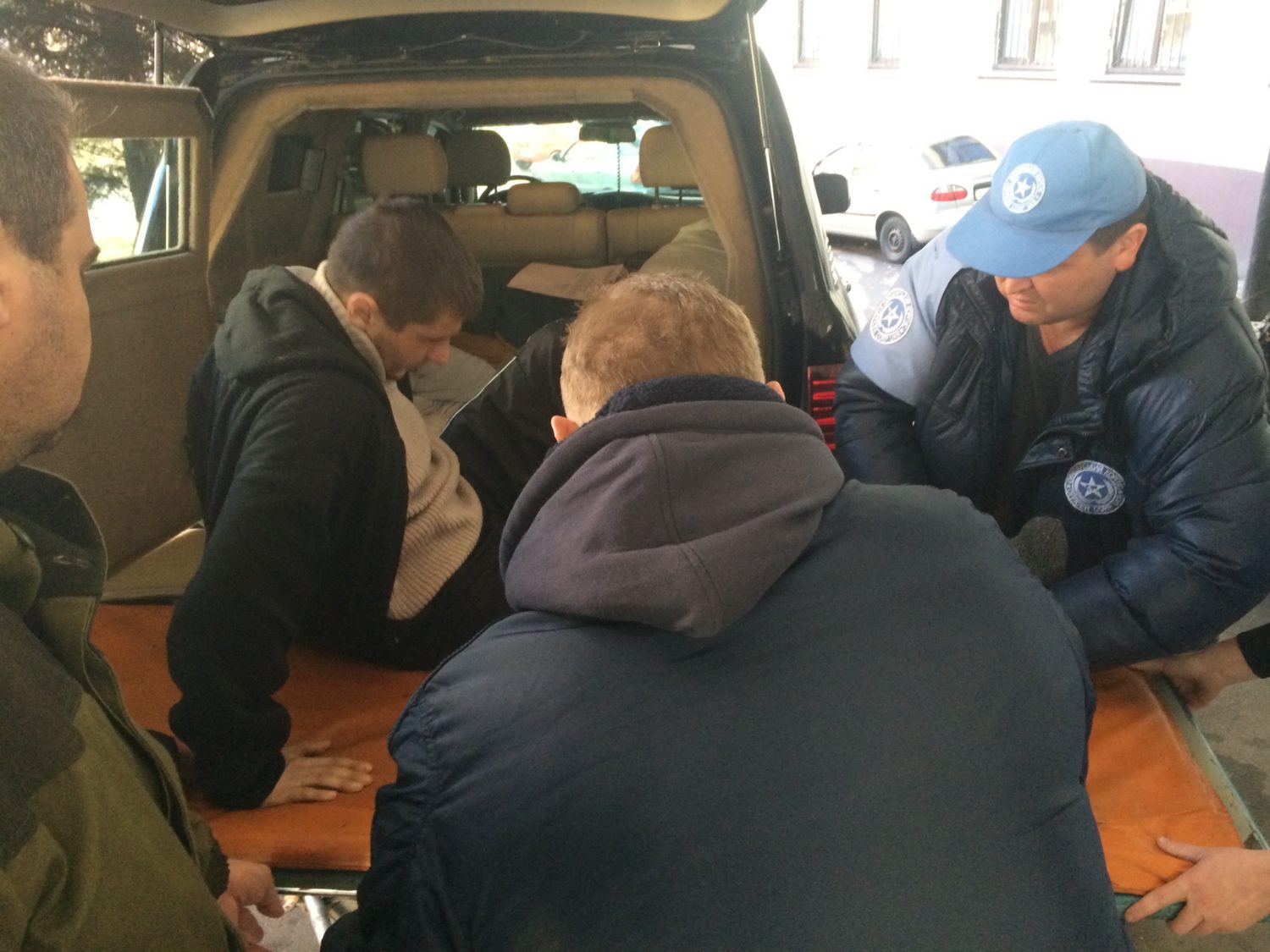
A 300 for a 300
Over the last week, the Ukrainian media has blown up with the news that there’s likely going to be an exchange between Kyiv and Moscow of war criminals on the one side, and prisoners of war and political prisoners on the other. The Ukrainian and Russia media say that the sides will ostensibly make a one-for-one swap of up to 33 captives. Among them are 24 Ukrainian sailors who were illegally detained near the Kerch Strait, as well as the director Oleh Sentsov, activist Mykola Karpiuk, and Pavlo Hryb, a student of Kyiv-Mohyla Academy who was kidnapped in Belarus. In exchange, Ukraine apparently is planning on returning ex-DNR fighter Volodymyr Tsemakh, a key witness in the shooting-down of Malaysia Airlines Flight MH17, whom the court in Kyiv released on personal recognizance on September 5.
Meanwhile, a soldier from the 1st Tank Brigade, Bohdan Pantiushenko, has been in captivity in Donetsk for over four years since January 2015. He and dozens of other Ukrainian prisoners of war have been waiting to be liberated for years. Unfortunately, there is no news about their return to Kyiv.
The editors at Reporters have asked Kyiv journalist Olha Omelianchuk to share her personal recollections from an exchange between the Ukrainian side and the DNR fighters that happened five years ago. This story, ultimately, is a reminder that real human lives are concealed behind statistics.
Almaty and Chonhar
In a former children’s summer camp on the banks of the Dnipro, a group of people are examining lists of prisoners of war and civilians who were detained illegally by the occupiers. There are dozens of last names with birthdates; under some of them there are handwritten notes like “possibly 200, three people saw his tank blow up, but the parents don’t believe their son died.”
“Two-hundred” is the scariest word for soldiers. It is a bitter code that marks the dead. The unwritten rule of war is that if three survivors witness a death, the person can be considered dead. However, soldiers’ parents live according to the rules of life, not war: they refuse to accept this and spend years searching for their children among captives and the missing.
Fall 2014 is cold and gray; it’s irritating and tugs at the heart. Ilovaisk has already happened; the seizures of the Donetsk airport and Debaltseve are still ahead.
The group of people at the summer camp are representatives of a civil organization founded by Volodymyr Ruban called Officer’s Corps. On the one hand, five years ago he was known as the director of the Center for the Release of Captives who helped free hundreds of Ukrainians, and as a retired officer who started getting people out of captivity even before the proper offices started doing it officially. On the other hand, he has been accused multiple times of supporting LDNR fighters and taking money for freeing prisoners of war.

“Tomorrow,” Ruban says, “we have to get up very early. We’re going to Donetsk for an exchange. We’ll be swapping a 300—someone badly injured from the DNR who is right now receiving treatment in Dnipro—for a badly injured Ukrainian soldier.”
Ruban’s nickname in the Officer’s Corps comes from where he was born, Almaty. Studying the list of prisoners that evening (like usual), the short man with a shaved head and a thick, red-gray beard, barely smiles. Time after time he adjusts his thin-rimmed glasses and later takes them off and, fighting fatigue, rubs the bridge of his nose.
“You must be getting really tired?”
“I don’t have time to be tired. Have you seen how many people are on the list? Do you known how often mothers of captives call me? Have you ever talked to parents who don’t know where to look for their child—among the living or among the dead?”
His questions hit me in the gut. I keep quiet so as not to cry.
Поки члени «Офіцерського корпусу» обговорюють майбутній обмін, поруч волонтерка Алла Борисенко розробляє план евакуації з окупованої території тіла загиблого бійця ЗСУ. Єдина в організації жінка, вона допомагала українським військовим із перших днів війни, зокрема їздила на кордон з анексованим Кримом, за що отримала позивний Чонгар. While the members of the Officer’s Corps discuss the future exchange, nearby volunteer Alla Borysenko is developing the plan for evacuating the body of a deceased member of the Ukrainian Armed Forces from the occupied territory. The only woman in the organization, she has been helping the Ukrainian military from the first days of the war, in particular going to the border of annexed Crimea which got her the nickname Chonhar after a village there.
“Two-hundred” is the scariest word for soldiers. It is a bitter code that marks the dead. The unwritten rule of war is that if three survivors witness a death, the person can be considered dead
In a warm room with an enormous plush bear on the bed, Chonhar, the mother of three children, tells me how she looked for pillows for the paratroopers’ machine guns, but failed to get them there before the guys perished. She remembers how along with the bodies of Ukrainian soldiers she also found the remains of separatist fighters on the field of battle. Her voice trembles when she says that in those cases she was forced to contact the enemy for the mercenaries’ attitude toward our dead and captive depended on her humanity in particular.
“I Think I’ll Be Killed by My Own”
In one of the former camp’s bedroom blocks, a 25-year-old DNR fighter is waiting for the morning exchange. He refuses to give his real name and lies on the bed practically immobile. He looks out from under his brow with distrust and doesn’t say a word. And then he notices that I myself don’t know what to talk to him about or how: I’m just sitting across confused by a mixture of hatred for this—albeit bedridden, nonetheless—enemy and restraint from the awareness that without him, tomorrow they won’t give us our soldier back.
“You should eat, we’ve got a long road ahead,” Ruban brings the prisoner of war his dinner. “If you can’t lift your hand, ask the journalist and she’ll help you.”
I again suppress my anger, joking that I’ll help him if he sings the Ukrainian anthem.
The mercenary unexpectedly breaks out into “Ukraaaine has not yet died, nor its glory, nor its freeeedom.”
He sits up, leaning on his skinny, shaking arms and tries to eat on his own.
“Wow, you know the anthem!”
“What did you expect? I’m from Luhansk, half of our region speaks Ukrainian.”
“Why are you fighting for the invaders then?”
“Not for the invaders, but for the Donbas! I hardly even fought— didn’t even kill anyone.”
“Right, that’s what you all say. It’s somehow hard to believe.”
The room becomes tense. The weakened fighter can’t even manage half his dinner. He pushes the tray away, moans, turns on the bed, and complains that after his injury he can barely feel his legs.
He says he’s cold and asks for socks. In my backpack is a pair of large woolen socks, knitted by volunteers from Transcarpathia. On the eve of the exchange, soldiers from the 128th Mountain Assault Brigade gave them to me as a present. I brought them just in case it was cold in the camp. So I give him the socks. I don’t know if it was for the anthem or I just felt sorry for him.
The fighter received the serious injury, due to which he can’t stand up, near Volnovakha about a month ago. He tells me about the day when he “caught” the shrapnel from the grenade in his belly and a sniper’s bullet in his leg.
“There we were, sitting in that house, and then, bam, the Ukrainian army is attacking. My friend threw a grenade—Bang! But he failed, and all the pieces flew at me. I was lying in my own blood when a bullet from a sniper flew into my leg. I thought I would die, but the ‘Ukrops’ (Ukrop is Russian for “dill.” Since 2014, it has also been used as an ethnic slur for Ukrainians, especially those seeking political independence from Russia. — R.) took me into captivity. They sent me to the hospital in Volnovakha, and evacuated me from there to Dnipro.”
I ask questions, but he’s getting his words mixed up. He’s convinced that he was shot by a DNR sniper. Probably the guy thought he had information that they couldn’t risk the Ukrainian military knowing.
“Actually I’m afraid of going back to Donetsk. I think I’ll be killed by my own,” he suddenly says frightened.
Then he affirms that in the Volonvakha hospital where, no exaggeration, they saved his life, someone came from the Ukrainian Security Service (SBU) and “shoved needles in his heels to get information out of him.” He swears by God that he was only in the invaders’ army for a few months. However, he openly says that he followed “his guys” because the Russians promised a monthly salary of a few hundred dollars.
“What will you do after the exchange?”
“I’m going to take care of my health. I have to get on my feet.”
“And then what? Will you again fight for ‘your guys’?”
“No way, are you kidding? Actually, half of my family supported the new Ukrainian government during the Maidan. Now I will definitely stay out of politics. I’m going to build a family.”
I’m Happy That I’ll Live
We drive into occupied Donetsk before dawn. Ruban, two others from the Officers’ Corps, and I are in an huge armored humvee. The injured fighter is in the back lined with soft blankets and mattresses. He moans at nearly every bump, and keeps asking if we will be going past the invaders’ checkpoint near Olenivka.
“Just not there,” he begs. “Anywhere but there! Not there! They’re such animals. They won’t let us through. They could kill us!”

In order not to thwart the exchange and not harm the ones whom we’re not taking home today, I am forbidden from photographing, talking, or even looking in the direction of the fighters. I simply try to remember the column of machinery with Russian flags, the bearded old men in papakha hats with machine guns slung over their shoulders, and the “Minister of Revenue and Fees of the DNR,” Aleksandr Timofeev, aka Tashkent, who has coordinated the exchange on the behalf of the fighters. Donetsk, the city of a million roses, I remember from before the occupation. I liked the city’s “factory” flavor and the local jokes about how they’re building a metro in their city in approximately never. At the UEFA Euro 2012 championship, the grandiosity of the new Donbas Arena soccer stadium literally took my breath away. Today it is fear that takes my breath away. No matter how Ruban and the two other members of the Officers’ Corps try to preserve our safety, there will be safety on the enemy side in approximately never.
The appearance of the fighters’ military machinery makes me press my entire body into the seat while Ruban calmly explains that in place of the mercenary they’re giving us a 29-year-old soldier from the 72nd Mechanized Brigade, Serhii Diatel. He was captured by soldiers of the so-called Oplot 5th Motor Rifle brigade. The man has spent a few months in captivity.
“Diatel,” Ruban says, “is in bad shape: he has an injury to his abdominal cavity. He needs to be taken to the hospital in Dnipro as quickly as possible. I hope nothing happens along the way.”
At the place for the exchange on the territory of one of Donetsk’s hospitals, everything does happen fast. In just a few minutes, the mercenary is taken inside on a gurney. The Ukrainian soldier, also on a gurney, is wheeled to our humvee.
Serhii Diatel is pale and weak. Due to his serious injury, his digestive organs have practically shut down, so the doctors in Donetsk were forced to create a stoma for him. He is wearing civilian clothes—a tracksuit and a beige sweater. Serhii is helped into the back of the vehicle where the fighter had been lying a few minutes before. The guy is anxious and from time to time apologizes for his condition as though the stoma is bothering not only him, but the rest of us as well.
“Forget it,” Ruban answers him. “Your wife is already waiting for you in Dnipro. Everything will be fine. Tell me if you start feeling ill, and if you’re up to it, you can talk to Olia. She’s a journalist.”

Місто без мільйона троянд і найкрутішого футбольного поля залишається позаду. Повертаюся до бійця. На його обличчі ходять жовна. The city without a million roses or the coolest soccer field sinks away behind us. I turn to the soldier. He’s clenching his teeth.
“How’d you end up in captivity? What happened?”
“I drove out from a position near Donetsk to a store. Our car got under gunfire. A bullet penetrated my back and came out my belly. But I’m happy that I’ll live.”
He recalls captivity reluctantly. He says the fighters felt sorry for him because of his serious condition and let his relatives visit him in Donetsk, his wife, father, and sister.
“There were guards in the hospital. Since I couldn’t run away, I think they were actually guarding me from the injured fighters around me. My relatives paid for the surgeries and my medicines. Now I’m trying not to think about the negative. I’m just glad that I’ll finally be home.”
We get to the hospital in the middle of the night. Serhii spots his wife immediately. Despite his pain, he breaks into a smile.
There is a long rehabilitation ahead. No one gets out of captivity that easily.
***
Five years later I couldn’t get in touch with Serhii Diatel. He had changed phone numbers and wasn’t answering Facebook messages. According to volunteers at the military hospital in Kyiv, today he has almost completely recovered. He works and looks after his family.
In March 2018, Volodymyr Ruban was detained at the Maiorsk checkpoint when he was leaving the temporarily occupied territory. The border guards found a sizeable arsenal of weapons and ammunition in the director of Officers’ Corps’s car and turned him over to the SBU. The negotiator and the former prisoner Nadiya Savchenko were accused of conspiracy and preparing terrorist acts in downtown Kyiv for a coup d’état. Due to the arrest deadline, in April 2019 the court released both of them from under arrest, but the hearings are still pending.
I know nothing of the injured DNR fighter’s fate. Perhaps those woolen socks knitted by a Transcarpathian volunteer and tied together with the yellow and blue ribbon still keep him warm.
Translated by Ali Kinsella.
[This publication was created with support of the Royal Norwegian Embassy in Ukraine. The views and opinions expressed in this publication are those of the authors and do not necessarily reflect the official position of the Norwegian government].
Have read to the end! What's next?
Next is a small request.
Building media in Ukraine is not an easy task. It requires special experience, knowledge and special resources. Literary reportage is also one of the most expensive genres of journalism. That's why we need your support.
We have no investors or "friendly politicians" - we’ve always been independent. The only dependence we would like to have is dependence on educated and caring readers. We invite you to support us on Patreon, so we could create more valuable things with your help.
Reports130
More






